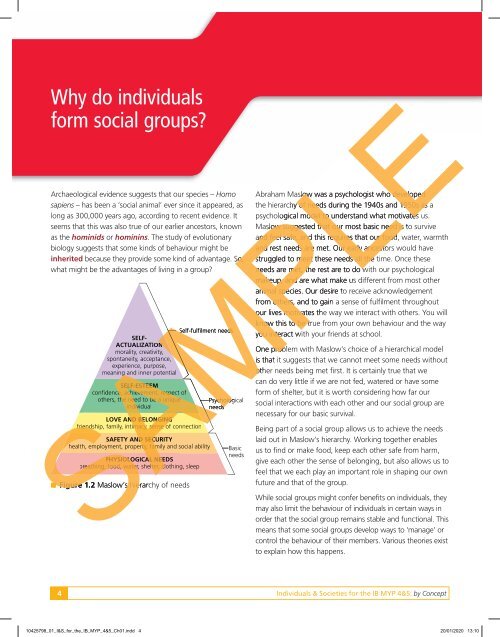Individuals-and-Societies-Sample
You also want an ePaper? Increase the reach of your titles
YUMPU automatically turns print PDFs into web optimized ePapers that Google loves.
Why do individuals<br />
form social groups?<br />
Archaeological evidence suggests that our species – Homo<br />
sapiens – has been a ‘social animal’ ever since it appeared, as<br />
long as 300,000 years ago, according to recent evidence. It<br />
seems that this was also true of our earlier ancestors, known<br />
as the hominids or hominins. The study of evolutionary<br />
biology suggests that some kinds of behaviour might be<br />
inherited because they provide some kind of advantage. So,<br />
what might be the advantages of living in a group?<br />
Self-fulfilment needs<br />
SELF-<br />
ACTUALIZATION<br />
morality, creativity,<br />
spontaneity, acceptance,<br />
experience, purpose,<br />
meaning <strong>and</strong> inner potential<br />
SELF-ESTEEM<br />
confidence, ce, achievement, respect of<br />
others, the need to be a unique<br />
individual<br />
LOVE AND BELONGING<br />
friendship, family, intimacy, sense of connection<br />
SAFETY AND SECURITY<br />
health, employment, property, family <strong>and</strong> social ability<br />
PHYSIOLOGICAL NEEDS<br />
breathing, food, water, shelter, clothing, sleep<br />
<br />
Figure 1.2<br />
Maslow’s s hierarchy of needs<br />
Psychological<br />
needs<br />
Basic<br />
needs<br />
AMo<br />
Abraham Maslow was a psychologist who developed<br />
the hierarchy of needs during the 1940s <strong>and</strong> 1950s as<br />
a<br />
psychological model to underst<strong>and</strong> what motivates<br />
us.<br />
Maslow suggested that our most basic need is<br />
to<br />
survive<br />
<strong>and</strong> feel safe, <strong>and</strong> this requires that our food,<br />
water, warmth<br />
<strong>and</strong> rest needs are met. Our early ancestors would have<br />
struggled to meet these needs all the<br />
time. Once these<br />
needs are met, the rest are to do with our psychological<br />
makeup, <strong>and</strong> are what make us<br />
different from most other<br />
animal species. Our desire to<br />
receive acknowledgement<br />
from others, <strong>and</strong> to gain<br />
a sense of fulfilment throughout<br />
our lives motivates the way we interact with others. You will<br />
know this to be true from your own behaviour <strong>and</strong> the way<br />
you interact with your friends at school.<br />
One problem with Maslow’s choice of a hierarchical model<br />
is that it suggests that we cannot meet some needs without<br />
other needs being met first. It is certainly true that we<br />
can do very little if we are not fed, watered or have some<br />
form of shelter, but it is worth considering how far our<br />
social interactions with each other <strong>and</strong> our social group are<br />
necessary for our basic survival.<br />
Being part of a social group allows us to achieve the needs<br />
laid out in Maslow’s hierarchy. Working together enables<br />
us to find or make food, keep each other safe from harm,<br />
give each other the sense of belonging, but also allows us to<br />
feel that we each play an important role in shaping our own<br />
future <strong>and</strong> that of the group.<br />
SAMPLE<br />
While social groups might confer benefits on individuals, they<br />
may also limit the behaviour of individuals in certain ways in<br />
order that the social group remains stable <strong>and</strong> functional. This<br />
means that some social groups develop ways to ‘manage’ or<br />
control the behaviour of their members. Various theories exist<br />
to explain how this happens.<br />
4<br />
<strong>Individuals</strong> & <strong>Societies</strong> for the IB MYP 4&5: by Concept<br />
10425798_01_I&S_for_the_IB_MYP_4&5_Ch01.indd 4 20/01/2020 13:10














